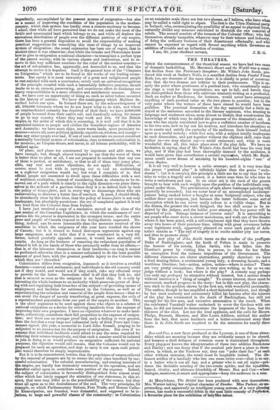THE THEATRES.
SINCE the commencement of the theatrical season we have had two cases of dramatic backsliding. Mr. Marston's Heart and the World was a mani- fest decline from the Patrician's Daughter: Mr. White's John Savile, pee_ duced this week at Sadler's Wells, is a manifest decline from Feudal Times Roth, too, are descents of the same class: it is chiefly in point of construc- tion that the two dramas are inferior to their predecessors. This is ex- actly the point where gentlemen of a poetical turn, who occasionally make the stage a vent for their inspirations, are apt to fail; and herein they are distinguished from those who cultivate dramatic writing as a profession. Such an author as Buckstone, for instance, would never have attempted anything of such poetical value as the two pieces in question ; but in the very point where the writers of these have sinned he would have been guiltless. The practical dramatists of the day naturally feel a little an- noyed at the eminence accorded to the literary aspirants, who, trusting to language and sentiment alone, seem almost to disdain that construction the knowledge of which may be called the grammar of the dramatist's art. A man who has nicely considered how to give a sufficient number of incidents to his two acts, how to lay out his motives, and introduce his situations so as to excite and satisfy the curiosity of his audience, finds himself looked upon as a useful nobody; while five acts, with a subject totally inadequate to such dimensions, and put together without the slightest skill, raise their author to—we may almost say—a social eminence; and, what is more wonderful than all, this takes place even if the play fails. We have no hesitation in saying, that if Mr. White's John Savile had been his very first play, and if that play had been thoroughly damned by the audience, it would have given him nevertheless a certain reputation, which Mr. Buck- stone could never dream of attaining by his hundred-nights " run " of
Green Bushes. .
It is all very well to honour a noble attempt; and it is very true that the genus "poetical play" is infinitely higher than the genus " melo- drama ": but it is carrying this principle a little too far to say that he who tries to write a tragedy and cannot, is a better man than he who tries to write a melodrama and can. In no other art is the rank of the genera brought to bear with such weight upon the position of the individuals com- prised under them. The preeminence of epic above landscape painting will generally be conceded; but we never hear of an accomplished landscape- painter being ranked below a bungler at some Scriptural subject, who can neither draw nor compose, just because the latter indicates some sort of conception which he can never really reduce to a visible shape. But in the drama, the greater the work designed, the less skill seems to be re- quired by the judges; and the bolder your attempt, the less power will be expected of yon. Strange instance of inverse ratio! It is astonishing to see people who sneer down a clever melodrama, and walk out of the theatre where it has been acted, with a self-complacent sigh that they have thrown away two hours of their precious time, sitting with great reverence before some legitimate work, apparently planned on some such parody of Aris- totle's maxim as " The end of tragedy is to excite neither pity nor terror, and thus to promote sleep."
The new play of John Batas turns on the murder of the profligate Duke of Buckingham; and the knife of Felton is made to preserve the honour of his cousin, Lilian Savile, who has fallen into the libertine's power by visiting him in person, to claim for her father an exemption from the ruinous impositions of the Government. The different characters are clever abstractions, prettily sketched: we have a fond doating father, a sentimental young lady, a dreaming fanatic, and a worthless libertine; but—action, action, action—where is action? There are very pretty conceptions; there is very nice writing, as far as we can judge without a book; but where is the play? A comedy may perhaps (we only say perhaps) be attractive without interest, but a serious drama without interest is a "thing of naught." To create interest, there must be movement, marked progress in the story: but in this new play, the charac- ters stick to the position shown by the first act, with wonderful pertinacity. The author, though he has amplified a short historical incident, and though he has most uselessly and erroneously killed his heroine after the interest of the play has terminated in the death of Buckingham, has still not enough for his five acts, and excessive attenuation is the result. When the celebrated Vauxhall waiter undertook to cover the Gardens with one ham, he did not intend to demonstrate the largeness of the ham, but the thinness of the slice. Let not the loud applause, and the calls for Messrs. Phelps, Bennett, Marston, and Miss Laura Addison, mislead the author from the fact, that more incidents and a better-constructed story than there is in John Savile are required to fix the attention for nearly three hours.


























 Previous page
Previous page